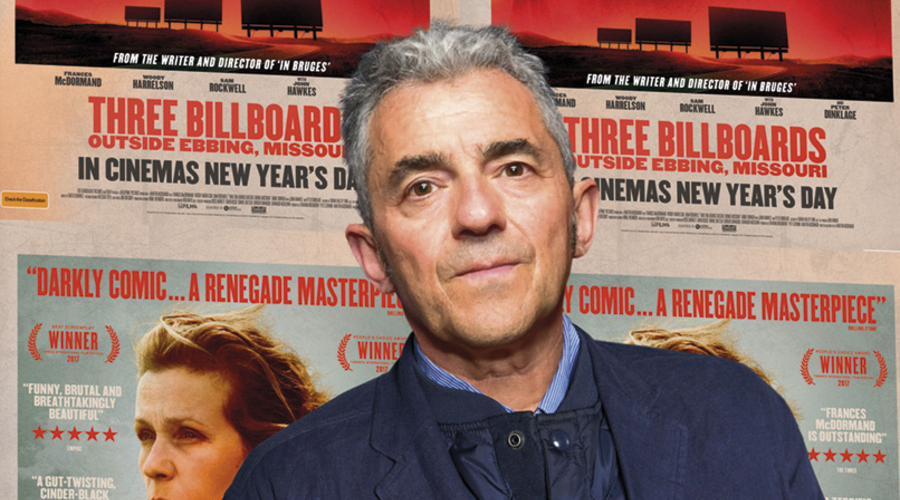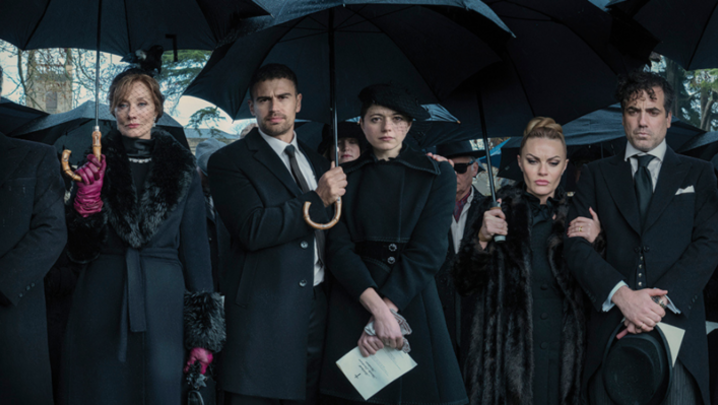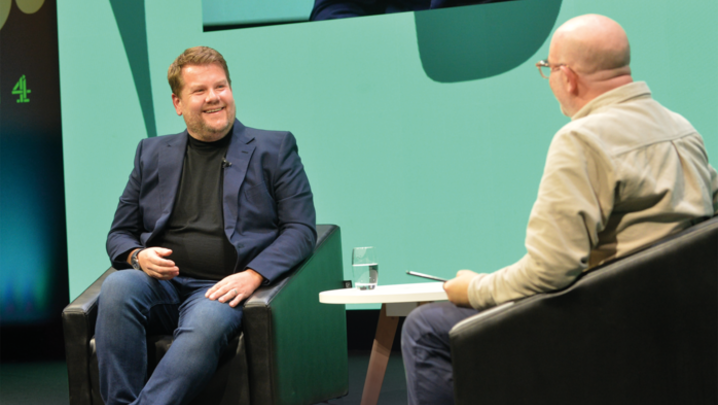Daniel Battsek explains to Stuart Kemp why Channel 4’s movie arm needs to focus more on the bottom line
Daniel Battsek landed the Film4 top job in July 2016. His friend David Abraham, then Chief Executive of Channel 4, had brought him in to spearhead the broadcaster’s feature-film strategy.
But less than a year after Battsek arrived, Abraham announced that he was leaving. In the ensuing management changes, former Shine Group CEO Alex Mahon was hired to replace Abraham. Battsek, flush with the success of Three Billboards Outside Ebbing, Missouri, is unfazed by the shake-up.
His career to date, including stints in the UK at Palace Pictures and Buena Vista, and then in New York as President of filmed entertainment at Miramax Films, president of National Geographic Films and president of Cohen Media Group, had prepared him for riding turbulence of this kind.
“I’ve worked for a few different places where there have been big shifts in the personality of the people leading the company,” Battsek says. “I was at Disney when Bob Iger replaced Michael Eisner, and I took over at Miramax from the Weinsteins [when Harvey and Bob Weinstein left to set up the Weinstein Company in 2005]. I feel relatively flexible and at ease with those sorts of changes at a company.”
The 59-year-old is sipping sparkling water in a meeting room at Film4’s Horseferry Road HQ in central London. The walls are adorned with reminders of the division’s successes – there’s Steve McQueen’s 12 Years a Slave, Danny Boyle’s Slumdog Millionaire, Lenny Abrahamson’s Room, Alex Garland’s Ex Machina and Asif Kapadia’s Amy.
“I am very excited by Alex’s leadership of Channel 4,” says Battsek, who is also untroubled by the planned relocation of hundreds of Channel 4 staff outside London.
He doesn’t know if Film4 will be expected to move, but industry observers suggest that this is unlikely: Film4’s output has always reflected the whole of the UK and it works regularly with film-makers who lack London accents. Think Shane Meadows (Once Upon a Time in the Midlands), Boyle (Shallow Grave) and Peter Cattaneo (The Full Monty).
UK-born Battsek’s return to London with his family in July 2016 followed the surprise departure of Film4’s previous CEO, David Kosse. He had been poached to run the international operation of US mini-studio STX Entertainment. Kosse (who replaced Film4’s long-serving and highly regarded head, Tessa Ross, in 2014) stayed on to work with Battsek until October 2016 to smooth the transition.
With Abraham’s backing, Kosse had embarked on a more aggressive and commercially minded deal-making strategy for Film4. The first project to emerge was Martin McDonagh’s Three Billboards, starring Frances McDormand, Woody Harrelson, Sam Rockwell and Abbie Cornish.
The film won five Baftas, including Best Film, and went on to win two Academy awards; McDormand won Best Actress and Rockwell scored Best Supporting Actor. It was nominated for a further five, including Best Film. Battsek was backstage at the Dolby Theatre just in case.
We want to make ourselves as self-sufficient as we can
When he took over at Film4, the script for Three Billboards was commissioned and a 50:50 financing agreement sealed with Fox Searchlight for Graham Broadbent and Pete Czernin’s British production outfit, Blueprint Pictures. “Once you partner with the likes of Fox Searchlight, you are giving a film the opportunity to have a US domestic release and a global roll-out. It’s a company that has had enormous success over many years in maximising the potential of films such as this,” says Battsek.
He admits that, at this stage, no one expected McDonagh’s film to become a $155m (£110m) worldwide box-office smash, although all agreed the script was brilliant.
It is likely that Film4’s profit from Three Billboards is in excess of £10m, an impressive return, given that its annual budget is around £25m a year.
“There will always be a quality threshold and we will always want to make films with film-makers we developed,” says Battsek. “But, although we are not for profit and, like the rest of Channel 4, funded by advertising revenue, we want to make ourselves as self-sufficient as we can.”
Film4 is aiming for self-sufficiency by 2020. Battsek says there will be more significant financial equity investments in certain films: “We are not trying to change the nature of Film4, we’re just trying to make sure that, for the films that have the most chance of being profitable, we have the most chance of sharing in that profit.”
Channel 4’s film arm has struck further similar deals across its development and financing slate. It is collaborating again with Fox Searchlight on Yorgos Lanthimos’ The Favourite. Set in 18th-century England in the court of Queen Anne, The Favourite stars Emma Stone, Rachel Weisz and Olivia Colman, and is tipped to premiere in competition at the Cannes Film Festival in May.
Film4 is partnering with World Wrestling Entertainment for Stephen Merchant’s Fighting With My Family, starring Dwayne Johnson and Lena Headey. MGM has global distribution rights.
There is a co-finance deal in place with US indie FilmNation for Sebastián Lelio’s Disobedience, starring Rachel Weisz, Rachel McAdams and Alessandro Nivola, which opens in the UK in May. It is about a woman who returns to her Orthodox Jewish home following the death of her rabbi father, only to stir up controversy in the family.
The arrival of Amazon and Netflix into the world of original content means Film4 is inevitably competing for material and kudos with the deep pockets of the US streaming giants.
“We have to find ways of ensuring that we can maximise our opportunities, sometimes working with them as partners,” says Battsek.
He points to Pawel Pawlikowski’s Eastern European drama Cold War, Lynne Ramsay’s New York-set thriller You Were Never Really Here and Mike Leigh’s Peterloo, about 19th-century England. On each of these projects, Film4 has teamed up with Amazon.
“All those deals are extremely advantageous to the films and to Film4,” Battsek explains. “The films that those film-makers wanted to make got made because of Amazon’s financial muscle.”
Film4 is involved with Netflix on Tinge Krishnan’s British musical Been So Long, starring Michaela Coel. Netflix has UK rights. “It involves a certain amount of careful negotiation in order to protect our various broadcast rights,” adds Battsek.
While Film4 can’t compete with the cash Netflix and Amazon are able to offer upfront, Battsek argues that he and his team offer an established and experienced production, development and financing team. This is coupled with a supportive and reassuring place to nurture film-makers and their vision.
Meanwhile, Film4’s development slate features an adaptation of Bernard MacLaverty’s novel Midwinter Break, with John Crowley set to direct, and a film of Peter Carey’s Booker Prize-winning novel True History of the Kelly Gang, starring Russell Crowe, George MacKay and Nicholas Hoult, with Justin Kurzel directing.
Film4 is partnering with the Ink Factory and Rise Film, to develop the spy drama The American War, and is also developing Dean Kuipers’ book Burning Rainbow Farm as a directing vehicle for Lenny Abrahamson. Anonymous Content and Element Pictures are producing.
The Festival, the first film from Film4’s four-picture deal with Fudge Park Films (the company formed by The Inbetweeners’ creators Damon Beesley and Iain Morris) is about to wrap. The movie marks Morris’s debut as a feature-film director. It is this mix of art-house and more commercial projects that defines the Film4 role.
“A great incentive is promoting British film and British film-makers, regardless of [whether] they are first-timers,” says Battsek. “We are also determined to make films representing race and gender so that their voices are heard.
“There’s a tremendous responsibility, which is part of the Channel 4 remit, to ensure that we focus on this as well, much as we focus on the more commercial end of films we make.”






